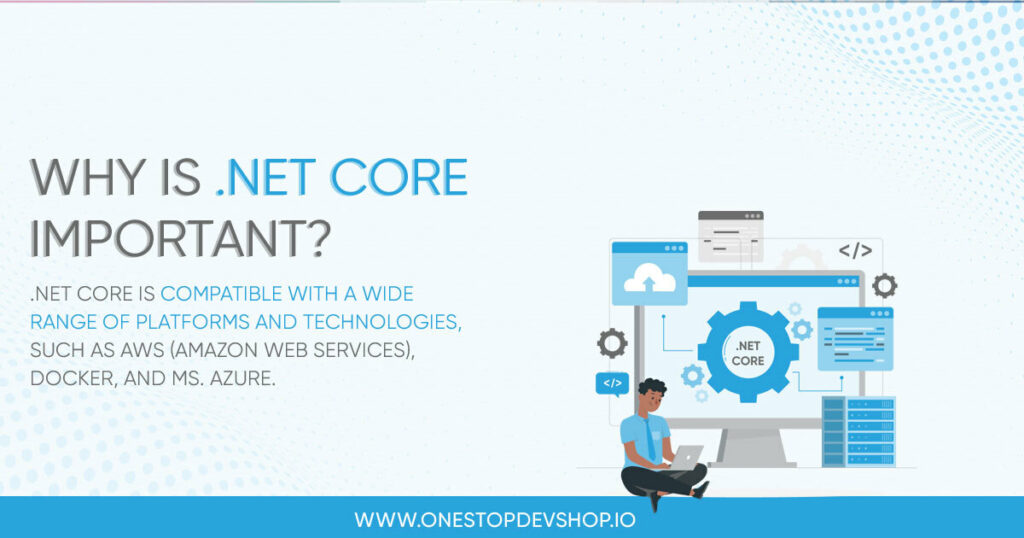As a developer, the availability of many platforms makes it hard to know which is best. We recommend that you consider using .NET Core. It’s different from the .NET Framework, so if you know how to use .NET, you’ll need to spend some time learning how to use .NET Core.
There are many reasons you should use .NET Core. Some of these reasons include cross-platform compatibility, its bugs are fixed quickly and modular design. Let’s look at why you should use .NET Core in detail as well as when to and when not to use it.
What Is .NET Core?

.NET Core is a broad and improved or new version of the .NET framework giving it more cross-platform ability, modularity, and scalability. Microsoft says that .NET Core is a cross-platform implementation of the .NET framework.
With regard to cross-platform support, backend developers can build, test and deploy Windows OS apps as well as MacOS and Linux apps via Xamarin. .NET Core is also powerful enough to develop cloud, IoT (internet of things), and web apps.
In addition, one of the most substantial refinements of .NET Core over .NET is its open-source nature. As a result, developers can leverage the power of this NET standard library platform without paying huge amounts of cash in licenses.
This means that .NET Core can be used by just about anyone with development experience, making .NET Core the go-to NET development platform for various developers and companies for various application needs.
What Are the Benefits of .NET Core?
.NET Core is Multiplatform
.NET Core is the first true cross-platform development framework from Microsoft. Previously multiplatform meant that you could use it to develop apps for various Windows OS versions.
But with .NET Core, developers can design, build, test, deploy and maintain applications for Windows OS as well as macOS and Linux. This is a huge leap over its predecessors (.NET) with regard to efficiency and scalability.
This multiplatform ability is a welcome addition for developers who work on macOS and Linux. In the past, Mac and Linux developers would have to purchase Windows OS gear which would have cost them a lot of money and time.
.NET Core is Open Source
Microsoft has been trying out the open-source approach for some time now. The first time the company did it was with ASP.NET MVC. This approach has been carried on to .NET Core, including the platform’s documentation.
This is great news for developers looking to work with open web development platforms. In addition, open-source application development platforms rank highly with regard to dependability, flexibility, and security.
The open-source nature of the .NET Core application development platform means that any developer can make changes to this NET platform. If Microsoft deems the changes vital to the performance of the platform, they will be made permanent.
.NET Core is Suitable for Microservices
The design and building of software applications using microservices is gaining traction. Prior to microservices, the most commonly utilized approach for designing and building applications was monolithic, one service responsible for everything.
Fortunately, .NET Core supports development using microservices. Not only does .NET Core allow for microservices integration, but the process is also very easy and efficient.
Cross-platform compatibility also means that applications already built using the .NET framework can be used in macOS and Linux, which reduces infrastructure costs significantly.
.NET Core Outperforms .NET
The difference in performance between .NET Core and the .NET framework is like night and day. Why? Because .NET is restricted by its legacy System.Web library ecosystem.
This means that the .NET Framework supports older versions of .NET projects, which has limited its evolution. .NET Core, in contrast, has changed the rules of the game, making it a powerhouse with regard to performance.
In .NET Core Bugs Are Fixed Quickly
If you’ve ever encountered a glitch in the .NET framework and reported it, you know how long it takes for Microsoft to fix glitches. Sometimes it takes as long as one year for glitches to be fixed, and sometimes the updates don’t work.
In addition, updates rolled out to fix problems can cause issues elsewhere. This means if you find a bug in the .NET Framework, you’re better off looking for an alternative as opposed to waiting for a comprehensive solution to be rolled out.
With .NET Core, things are different because updates meant to fix problems are released quickly. How? Because .NET Core is open source, meaning a developer on GitHub can propose a solution if Microsoft’s team is unable to come up with a solution.
How to Use .NET Core?

As we’ve mentioned above, .NET Core is an open-source framework for designing and creating applications for the Windows platform as well as macOS and Linux. That said, here are the steps to follow to use .NET Core to develop apps on your device.
Start by Installing .NET Core SDK On Your Device
Before you start designing and creating apps using .NET Core, you need to install .NET Core SDL on your device. Download the latest version on the .NET website.
Generate A New Project
The second step to using .NET Core is opening a command prompt dialogue window and entering the following command (dotnet new console -n myApp). This helps you create a new application with the title ‘My App.’
Launch The Newly Created Application
The third step is running the application you’ve just created. To do this, go to the project directory and enter the following command (dotnet run).
Write Code
Now that you’ve built a new .NET Core application, the fourth step is writing code.
Publish the Application
After writing code for your entity framework core app, you can publish it. Use this command (dotnet publish -c release) to help you share the app with other developers.
When to Use .NET Core
You should use .NET Core under the following circumstances:
When You Need a High-Performance System
You should use .NET Core when you want optimal performance and scalability. This is especially handy when utilizing microservices side by side. In such an instance, all that’s need is a smaller amount of servers and virtual machine.
Apart from saving on costs, the competence and scalability you get from the .NET Core platform should equal a better end-user experience.
When You’re Running Several .NET Versions Concurrently
To build and deploy applications dependent on different .NET framework versions, you should use .NET Core. Why? Because NET Core allows for multiple services to be executed on a mono server-side containing multiple versions of the .NET Framework.
When You Want Control Over The CLI (Command Line Interface)
Some developers want control over CLI. Fortunately, .NET Core has a command line interface for everything it supports, and the installation is fast on machines. In addition, .NET Core allows for migrating IDE (integrated development environment) like Visual Studio.
When You Want Your App to Run On Various Platforms
You should also use .NET Core if you want your application to run on other platforms apart from Windows OS. These include macOS and Linux, which are supported as development workstations. What’s more, the list of supported operating systems is rapidly growing.
When Working with Docker Containers
Containers and microservices are often used together thanks to their modular design. .NET core works well with containers, which allows for the deployment of multiplatform apps to Docker containers. .NET framework is also compatible with containers, albeit bigger.
When Not to Use .NET Core
.NET Core lacks some of the inherent .NET features, and neither does it support all .NET add-ons and class library. For this reason, you will encounter some instances when using .NET Core might not be the best option. Some of these instances include:
When Building High-Performance Applications
When you’re building high-performance applications, it may be unwise to use .NET core because these apps might not run optimally. For instance, if you’re building an app for multiple mathematical computations, consider using programming languages like Java or Visual Basic.
When Building Large Applications
As discussed above, .NET Core is mainly used for cloud-based apps and microservices. As a result, it may not be the ideal pick for large apps that need a lot of legacy code.
When Building Windows-Only Apps
If you’re building an application to run solely on Windows OS, then there is no need to use .NET Core to build it. Remember, one of its key benefits is its cross-platform ability.
When Your App is Dependent on 3rd Party Libraries Not Compatible with .NET Core
If the application you’re building has dependencies on 3rd party libraries that aren’t compatible with .NET Core, you should use the .NET Framework.
When You Want to Establish a WCF (Windows Communication Foundation) Service
Currently, .NET Core doesn’t offer support for WCF. Instead, you need to establish an application programming interface using ASP.NET Core MVC.
Why Is .NET Core Important?

Compatibility with Other Platforms
.NET Core is compatible with a wide range of platforms and technologies, such as AWS (Amazon Web Services), Docker, and Ms. Azure. This makes it easier for developers to design, build and deploy apps designed to leverage the robustness of these platforms.
Cutting-Edge Features
.NET Core comprises cutting-edge and new features like cloud-native development support, making it easier for developers to design, build and deploy cloud-based apps.
Flexibility
.NET Core offers developers a high level of flexibility, enabling them to pick the add-ons and libraries that best address their needs. This makes it easier for developers to design and build apps that are tailored to their needs.
Modular Design
.NET Core features a modular design. What does this mean? It means that developers have the freedom to select the components they need to build their apps. As a result, the applications built are small in size, which allows for less memory usage and fast startup times.
Security
When building .NET Core, Microsoft dedicated a lot of time and resources to security. Some inherent security features in .NET Core include CSRF (cross-site request forgery) and XSS (cross-site scripting). These safety features can thwart common threats.
Why .NET Core Is High Performance
JIT (Just-In-Time) Compilation
.NET Core utilizes just-in-time compilation to assemble an app’s code into machine code when executed. As a result, the app is faster than when using AOT (ahead-of-time) compilation.
Memory Management
.NET Core has an automatic memory management feature that frees up memory no longer being utilized by the application. This helps lower memory-related performance, and as a result, the application’s performance improves.
Multithreading Support
.NET Core offers native support for multithreading. What does this mean? It means with .NET Core; there is better performance of applications during runtime.
Optimized Libraries
.NET Core has a collection of optimized libraries designed to offer optimized functionality for a variety of instances. These libraries are efficient and can help boost application performance by reducing the amount of code a developer needs to write and maintain.
Performance Profiling
.NET has advanced performance profiling, which helps developers find and fix performance glitches in apps. This helps boost performance and offers end users a better experience.
Is .NET Core Good for the Future?
Yes, it’s considered a good NET applications platform for the future. Why? Because it offers APIs (application programming interfaces) for building various applications, from cloud-based applications to desktop and mobile apps (Android and iOS).
.NET Core also offers cross-platform app development. This means that developers can build apps for Windows OS as well as macOS and Linux making .NET Core ideal for a wide range of development professionals and companies.
In addition, Microsoft, the founder of .NET Core, is constantly investing in the platform’s research and development. This will ensure that .NET Core remains relevant in the coming years and all its libraries stay up-to-date.
As things continue to change rapidly, it’s likely that .NET Core will adapt to these changes making it a good option for creating dependable and scalable apps.
Why Use .NET Core to Develop Your Technology?

.NET Core Boosts the Productivity of Developers
.NET Core offers a dynamic and efficient working environment for developers, making it easier for them to create high-performance apps. .NET Core is able to do this thanks to features like a wide range of reusable libraries and improved debugging tools.
.NET Core Has Been Future-Proofed
Microsoft is the founder of .NET Core as well as .NET Framework. The company has heavily invested in both these platforms meaning .NET Core and .NET framework will most likely be updated with the latest trends in application and software development.
.NET Core Is Open-Source
.NET Core is an open-source application development platform. This means that as a developer you have access to the platform’s core code and can contribute to its development. The same applies to all other developers meaning .NET Core will only get better.
Conclusion
To sum it all up, .NET Core is an application development platform that’s becoming increasingly popular among developers. This is because .NET Core is free, modular, and open-source. So if you want to enjoy these benefits and more, choose .NET Core for your next app build.



